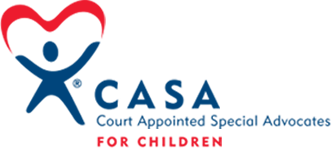Brush Country CASA Welcomes and Celebrates LGBTQ Volunteers for Youth in Foster Care
During June, LGBTQ Pride Month, Brush Country CASA is casting a spotlight on lesbian, gay, bisexual, transgender and questioning (LGBTQ) youth in the foster care system, and the need for LGBTQ and LGBTQ-affirming volunteers to advocate for their safety and well-being.
Brush Country CASA recruits and trains Court Appointed Special Advocates, or CASA volunteers, to speak up for the best interest of children in foster care. They are committed to serving all children in care in Brooks, Duval, Jim Wells, Kenedy and Kleberg Counties, including youth who identify as LGBTQ.
It is vital to not only affirm these youth, but celebrate them, explained Jennifer Rodriguez, Executive Director of Brush Country CASA.
“LGBTQ kids in foster care are especially vulnerable, and they’re at an increased risk for negative outcomes, so we want to use this month to spotlight and address the issue,” said Rodriguez. “We support all children in foster care, whatever their sexual orientation, gender identity and gender expression.”
In Texas and nationwide, LGBTQ youth are overrepresented in foster care, meaning that the percentage they make up of youth in foster care is greater than the percentage they represent of the general youth population. In fact, according to a study published by the American Academy of Pediatrics, 30 percent of youth in foster care identify as LGBTQ, compared to 11 percent of the general youth population. This is due in large part to the fact that coming out to family members who are not accepting can lead to harassment, abuse and even rejection, making it more likely for these children than their non-LGBTQ peers to experience homelessness or end up in foster care.
LGBTQ youth face even more challenges once they are in foster care, Rodriguez explained. Not only are they less likely to find permanency, but they have a higher average number of foster placements, higher rates of mental health challenges, and higher rates of reported harassment, discrimination and violence against them.
It is important for CASA volunteers to recognize these realities, she said, so that they can compassionately and effectively advocate for these children’s needs and help keep them safe while they are in foster care. It’s also critical so that they can have effective conversations with adults in children’s lives about being supportive—research shows that even just a little change towards being more accepting for parents, foster parents, guardians and caregivers can reduce a young person’s risk for negative outcomes.
“These kids need people on their side. We want to be able to offer volunteers who really understand the unique challenges they face,” said Rodriguez. “While all of our volunteers are prepared to advocate for any child, having LGBTQ volunteers is such an asset when advocating for LGBTQ youth in foster care. They can understand and empathize with these kids on a level many others cannot.”
Brush Country CASA welcomes, accepts and celebrates LGBTQ volunteers, and calls upon the LGBTQ community to reach a hand out to the LGBTQ youth currently in foster care. Help us provide kids in foster care with an advocate that can truly understand them and their unique experiences.
“We need more LGBTQ and LGBTQ-affirming volunteers. We want to work together with the LGBTQ community to make sure our CASA advocacy is the best it can be for the kids we serve,” Rodriguez said. “We want to create more positive outcomes for LGBTQ youth, turn around the statistics, and make sure they have the same chance to thrive as any other youth.”
For more information on becoming a CASA volunteer, visit www.brushcountrycasa.org or BecomeACASA.org. Our next volunteer training begins June 16th.
